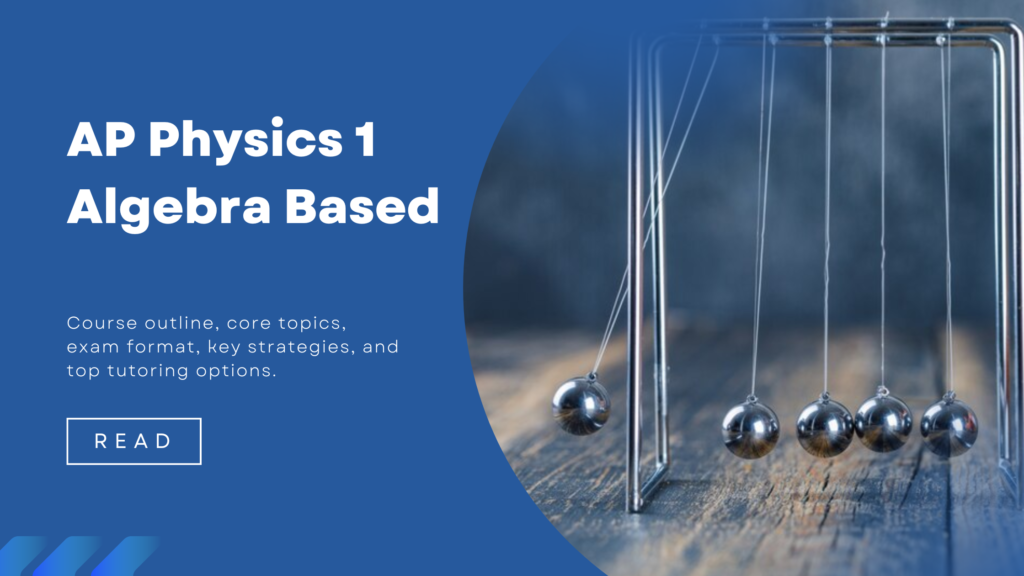“AP Physics 1: Algebra Based” helps you cultivate an understanding of Physics by developing models of physical phenomena through inquiry-based investigations.
This course is a stepping stone towards diverse career paths, including engineering, technology, and research, enabled through a more profound and deeper knowledge of physics.
This article covers the following: the “AP Physics 1: algebra based” course, its benefits, how to find the best for “AP Physics 1: algebra based” coaching, and how to prepare for the exam.
What is AP Physics 1?
“AP Physics 1” is a college-level introductory Physics course offered by the College Board as part of its Advanced Placement program.
It focuses on mechanics, including motion, force, work, energy, power, momentum etc. The course emphasizes problem-solving skills and critical thinking. It also involves hands-on laboratory work to understand physical phenomena.
What is AP Physics 1 Algebra Based?
AP Physics 1: Algebra based is the same as AP Physics 1. The term “algebra based” is added to emphasize that the course uses algebra, mathematical equations, and formulas, but not calculus, to solve Physics problems.
The key difference from other Physics courses is the focus on using algebraic equations to understand and solve physical problems.
By taking AP Physics 1: Algebra-Based, you’ll develop a solid foundation in concepts and problem-solving skills.
Before moving ahead with this article, don’t forget to check out more such related articles here:
“AP Physics 1: Algebra Based” Course Outline
The AP Physics 1 Algebra based course introduces students to the fundamental principles of Physics. It covers a range of topics, including:
| Unit | Exam Weighting (Multiple Choice Section) |
| Unit 1: Kinematics | 10%–15% |
| Unit 2: Force and Translational Dynamics | 18%–23% |
| Unit 3: Work, Energy, and Power | 18%–23% |
| Unit 4: Linear Momentum | 10%–15% |
| Unit 5: Torque and Rotational Dynamics | 10%–15% |
| Unit 6: Energy and Momentum of Rotating Systems | 5%–8% |
| Unit 7: Oscillations | 5%–8% |
| Unit 8: Fluids | 10%–15% |
Benefits of Taking “AP Physics 1: Algebra Based“?

Taking “AP Physics 1: Algebra based” offers several advantages that include:
1. Building a strong foundation for further studies
Physics graduates have opportunities in various fields like engineering, medicine, computer science, and research.
2. Developing skills
AP Physics Algebra based helps you develop various skills including strong math, problem solving skills, critical thinking, time management, logical thinking and analytical abilities, which are essential for various academic disciplines.
3. Introduction to experimental design and analysis
AP Physics 1 introduces students to experimental procedures and data analysis. These skills are invaluable for conducting research and understanding scientific studies in higher education.
4. Gaining college credit
A good score on the AP exam can earn you college credit or advanced placement, saving time and money.
5. Preparing you for standardized tests likes ACT and SAT
The problem-solving skills developed in Physics can benefit students on exams like the SAT and ACT.
What Are The STEM Fields AP Physics 1 Can Prepare Students For?
AP Physics 1 provides a solid foundation for a variety of STEM fields. Here are some examples:
· Engineering
Mechanical, electrical, aerospace, civil, and biomedical engineering all rely heavily on Physics principles.
· Computer Science
Understanding Physics concepts can be beneficial for fields like computer graphics, robotics, and game development.
· Mathematics
Physics often involves complex mathematical modeling, which can be helpful for math-related majors.
· Pre-med
A strong Physics background is valuable for understanding medical concepts like biomechanics, optics, and medical imaging.
Ready to Ace Your AP Physics Exam?
Enroll for AP Physics exam at PrepGenius!
Exam Format for AP Physics 1 Algebra Based
The “AP Physics: Algebra based” is a 3 hour-long exam. There are two sections:
Section I: Multiple Choice
40 Questions | 50% of Exam Score | 80 Minutes
Students are given an assortment of discrete questions or question sets, which consist of a stimulus or a set of data along with a number of related questions.
Section II: Free Response
4 Questions | 50% of Exam Score | 100 Minutes
This section contains 4 free-response questions, one of each of the following types:
- Mathematical routines
- Translation between representations
- Experimental design and analysis
- Qualitative/quantitative translation
Scoring and Grading for AP Physics Algebra 1 Course
You can refer to the AP® Student Score Distributions released yearly by the College Board.
| AP Score | Credit Recommendation | College Grade Equivalent |
| 5 | Extremely well qualified | A |
| 4 | Well qualified | A-, B+, B |
| 3 | Qualified | B-, C+, C |
| 2 | Possibly qualified | N/A |
| 1 | No recommendation | N/A |
Key Strategies for “AP Physics 1: Algebra Based” Preparation

Effective preparation for AP Physics 1 requires a strategic approach. Here are some key strategies:
1. Understand the core concepts
AP Physics 1 covers fundamental Physics principles that are essential for more advanced courses. A deep understanding of these concepts provides a solid base for tackling complex topics in subsequent Physics classes.
2. Develop a conceptual framework
Connect different topics to create a comprehensive understanding of the principles of Physics.
3. Build problem-solving skills
Solve different problems to enhance problem-solving abilities. Break down problems into smaller steps to identify the appropriate equations and variables. Follow a consistent problem-solving process to improve accuracy and efficiency.
4. Prepare a timetable
Create a study timetable and allocate a specific time slot for each topic and practice problems. Focus on areas where you need improvement
5. Take advantage of available online resources
Use textbooks, online resources, and video tutorials to supplement classroom learning. Collaborate, discuss concepts, and solve problems together with peers.
What’s the difference between AP Physics 1, 2, and C?
Refer to the table below to understand the difference between AP Physics 1, 2, and C.
| Course | Description | Math Requirement |
| AP Physics 1 | Introductory Physics concepts, Algebra based | Algebra |
| AP Physics 2 | Builds on AP Physics 1, broader topics, Algebra based with some pre-calculus | Algebra (some pre-calculus) |
| AP Physics C | In-depth exploration of mechanics and, electricity & magnetism requires calculus | Calculus |
Tips to Solve “AP Physics 1 Algebra Based” Sample Questions
Here are a few tips to solve AP Physics 1 Algebra based sample questions:
· Visualize the problem
Create a mental picture or a physical diagram of the situation. This helps in understanding the relationships between different quantities.
· Identify relevant formulas
Choose the appropriate equation(s) that connect the given information to the unknown.
· Break down complex problems
Divide complex problems into smaller, manageable steps. This makes the problem easier to solve.
· Check units
Ensure consistency in units throughout the problem. Incorrect units can lead to wrong answers.
· Practice regularly
Consistent practice is key to mastering problem-solving skills. Solve different kinds of problems to build confidence.
When can I Apply for “AP Physics 1: Algebra Based” Tutoring?
In grades 11 or 12, the majority of students take AP courses and tests. Although AP exams can be taken in any grade, most schools do not offer AP courses to ninth-graders.
PrepGenius – Best “AP Physics 1 Algebra Based” Coaching Centre
PrepGenius has established itself as a premier coaching center for students aiming to conquer the AP Physics 1 exam. With a track record of producing high scorers, they offer a comprehensive approach to mastering this challenging subject.
Why Choose PrepGenius?
PrepGenius is India’s No.1 AP, ACT, and SAT coaching center.
· Expert Faculty
They have highly skilled and seasoned Physics lecturers on staff who can simplify difficult ideas into language that everyone can grasp.
· Customized Learning
PrepGenius offers tailored coaching plans to address the specific needs of students, ensuring maximum benefit.
· Comprehensive Curriculum
Their curriculum aligns perfectly with the AP Physics 1 syllabus, covering all essential topics in depth.
· Practice and Assessments
Regular practice tests and assessments help students track their progress and identify areas for improvement.
· Doubt Clearing Sessions
Students have ample opportunities to clarify doubts and seek guidance from experts.
How to Apply for PrepGenius Coaching
Applying for PrepGenius coaching is an easy process:
- Visit the PrepGenius website: Explore their website to gain insights into their programs, faculty, and student testimonials.
- Contact Admissions: Contact their admissions team through their website or contact information.
- Provide Necessary Details: Share your academic background, target score, and preferred coaching mode (online or offline).
- Enrol in the Program: Complete the enrolment formalities and fee payment once your application is approved.
- Start Your Learning: Begin your AP Physics 1 coaching adventure with PrepGenius.
Conclusion
“AP Physics 1: Algebra-based” is a challenging yet rewarding course that lays a strong foundation for future science and engineering studies. Students can excel in this course by understanding the core concepts, practicing problem-solving, and utilizing available resources. Remember, consistency is key to success. Whether you opt for self-study, classroom instruction, or supplemental tutoring, the dedicated effort will undoubtedly lead to mastery.
Frequently Asked Questions For AP Physics Algebra Based
What is AP Physics 1 Algebra based?
“AP Physics 1: Algebra based” is an introductory college-level Physics course that focuses on teaching fundamental Physics principles using algebra. It emphasizes problem-solving, critical thinking, and experimental design.
How many units are there in “AP Physics 1: Algebra based’ course
The “AP Physics 1: Algebra based” course is typically divided into 8 units:
- Fluids
- Kinematics
- Dynamics
- Work, Energy, and Power
- Momentum
- Simple Harmonic Motion
- Torque
- Rotational Motion
Where to find “AP Physics 1: Algebra based” prep guides?
You can find “AP Physics 1: Algebra based” prep guides through various sources:
- Libraries: Public and school libraries often have a collection of study guides and textbooks.
- Online platforms: Websites like Amazon, Barnes & Noble, and Chegg offer a variety of prep books.
- Textbook publishers: Many Physics textbooks come with accompanying study guides.
- AP Central: The College Board’s AP Central website provides valuable resources, including sample questions and practice exams.
How can PrepGenius help in “AP Physics 1 Algebra based” coaching?
PrepGenius offers comprehensive coaching for “AP Physics 1: Algebra Based”
Their services include:
- Doubt-clearing sessions for clarification
- Expert instruction from experienced Physics teachers
- Study plans customized to cater to individual student
- Comprehensive curriculum covering all course topics
- Practice tests and assessments to monitor progress
How long is the “AP Physics 1 Algebra based” exam?
The AP Physics 1 Algebra Based exam is typically 3 hours long. It consists of two sections:
- Section 1: Multiple-choice section: 80 minutes
- Section 2: Free-response section: 100 minutes
Can you use a calculator in the AP Physics exam?
Yes, graphing calculators can be used in the AP Physics 1 exam. This calculator can be used for calculations, graphing functions, and other mathematical operations. Read more here about what calculators you can use for the AP Physics 1 Algebra based exam.
What are some examples of the problems students will solve in AP Physics 1 Algebra based?
Here are some examples of problems students might encounter in AP Physics 1:
- Calculating the acceleration of a falling object
- Determining the forces acting on an object on an inclined plane
- Finding the kinetic and potential energy of a moving object
- Analyzing the motion of a pendulum
- Solving problems involving collisions
- Calculating the torque on a rotating object
These problems require students to apply Physics concepts, use mathematical equations, and interpret results.
Why is AP Physics 1 harder than 2?
AP Physics 2 covers different content. It’s also an algebra-based course and can be considered a continuation of AP Physics 1. The level of difficulty is comparable to AP Physics 1, but it may seem more challenging due to the introduction of more abstract concepts and a broader range of topics.
How hard is AP Physics 1 Algebra based?
AP Physics 1: Algebra-based is considered a challenging course. It requires a strong understanding of algebra and problem-solving skills. It tests your ability to apply concepts to real-world situations. However, with dedicated study and practice, it is achievable.
Should I take AP Physics C without AP Physics 1?
According to the College Board, you do not need to have taken AP Physics 1 in order to tale AP Physics C: Mechanics. The two courses are very different from each other, especially since AP Physics 1 is Algebra based while AP Physics C: Mechanics is calculus-based, so they will involve very different math skills.

